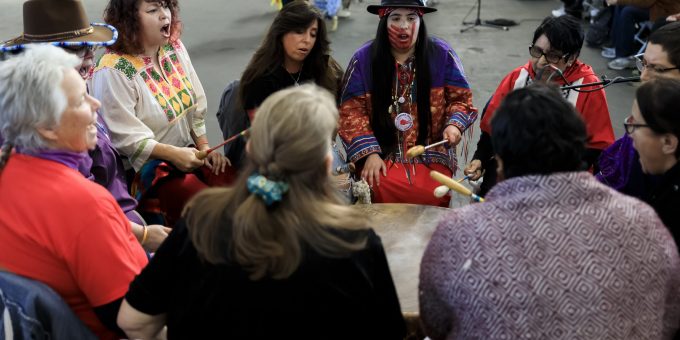
At the Bay Area Two-Spirit Powwow in 2020, a drum circle draws attention to Missing and Murdered Indigenous Women and Girls, or MMIWG. iStockPhoto.com // SvetlanaSF
worthless bodies, legitimized violence
Do you know how many missing and murdered Indigenous women, girls, and 2SLGBTQQIA1 people are in what is now called “Canada”? Shockingly, it appears that the police do not. In a recent article in Gender & Society, Jerry Flores and Andrea Román Alfaro investigate the inadequate response of law enforcement agencies to such crimes and the ways police (in)actions serve to make sense of, justify, and/or dismiss this epidemic of violence.
Drawing on data from 48 interviews with Indigenous peoples and 219 testimonies from the Canadian National Inquiry into Missing and Murdered Indigenous Women and Girls, the authors find that the police use four main frames to make sense of violence against Indigenous women and girls in particular. These strategies include labeling Indigenous women and girls as “runaways,” “drunks,” “prostitutes,” and/or “drug addicts,” all negative stereotypes deployed to rationalize victimization as an inevitable outcome of personal choices. Moreover, the police dismiss violence with “indifference, callousness, and lack of information,” entrenching Indigenous women’s low status in the settler-colonial states. Lastly, the police employ a pair of narratives that justify and perpetuate violence: pathologizing the behavior of Indigenous women and asserting that “there’s nothing we can do.” Both narratives uphold and reinforce settler supremacy, allowing for the continued dismissal of violence against Indigenous women.The United Nations has identified violence against Indigenous women as a human rights concern and has urged governments worldwide to take action. This study, however, emphasizes the interactions between systemic discrimination and violence faced by Indigenous women in Canada. The findings imply that the police response to violence against Indigenous women, girls, and 2SLGBTQQIA1 people is insufficient, in part, because law enforcement institutions play a role in maintaining the settler-colonial relationship. A more just and equitable global society will require working to confront and demolish the systems that allow and perpetuate violence against vulnerable people.
